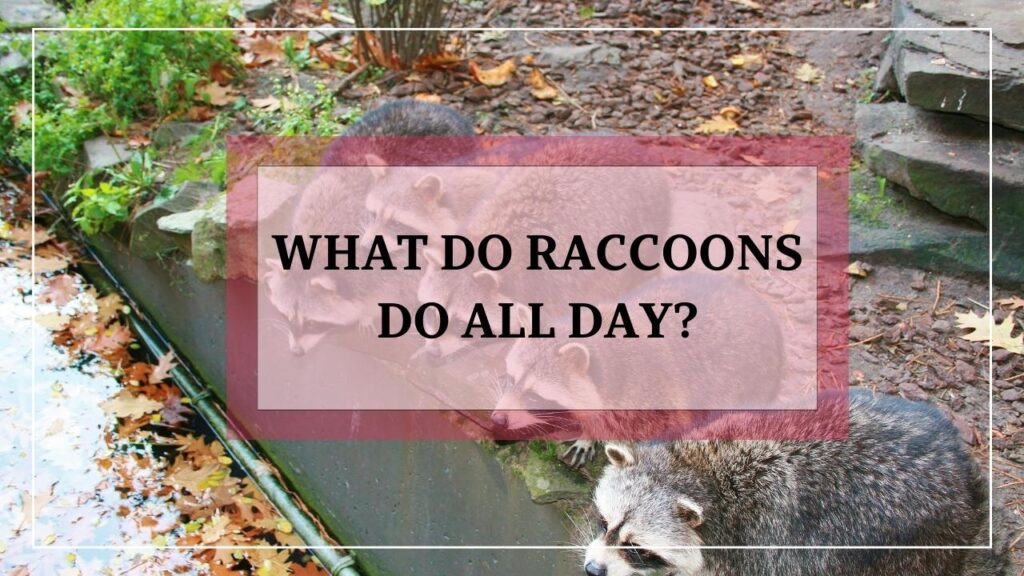Raccoons are fascinating creatures that live in forests, parks, and sometimes even in cities. They are known for their mischievous behavior and their clever ways of doing things. Have you ever wondered what raccoons do all day? Well, let’s find out!
Raccoons are mostly active during the night, which means they sleep during the day. They are nocturnal animals, just like owls and bats. While we are busy with school and other activities, raccoons find a cozy spot to rest and sleep in a tree hole, a burrow, or maybe even in an attic!
When the sun sets and darkness spreads across the land, raccoons wake up and start their adventures. These curious creatures are always on the lookout for food. They have nimble paws and sharp claws that help them climb trees and dig through the ground in search of delicious treats. Raccoons eat a variety of food, including fruits, nuts, insects, small animals, and even garbage from trash cans!
Besides hunting for food, raccoons also love to explore their surroundings. They climb trees, jump from branch to branch, and sometimes swim in rivers or lakes. They are excellent climbers and swimmers, and they use their long, bushy tails to help them balance.
Now that you know what raccoons do all day, get ready to discover more interesting facts about these clever critters!
Related Article:What Do Raccoons Do During The Day?
Related Article:What Do Raccoons Do During The Day?
The Nocturnal Lifestyle of Raccoons
Hey there, did you know that raccoons are some of the most fascinating creatures out there? These little critters have a unique lifestyle that is sure to captivate your attention. Let’s delve into the world of raccoons and explore their nocturnal habits.
Raccoon Habits and Behaviors
When it comes to adaptability, raccoons take the crown. They can be found all across North America, from bustling cities to remote forests. But what sets them apart is their preference for the nightlife. Yup, raccoons are primarily nocturnal animals, meaning they are most active during the night!
During the day, you’ll often find raccoons seeking shelter in cozy dens or tree hollows. They like to catch some z’s and hide away from the bright sunlight. But once the moon rises and darkness falls, these clever creatures come alive.
Raccoons are true omnivores when it comes to their diet. They have a knack for scavenging and can eat just about anything they can find. From fruits and nuts to insects, small mammals, birds, eggs, and even fish, raccoons have a diverse palate. Talk about being open-minded eaters!
What’s really impressive is their dexterity and intelligence. Raccoons have nimble paws that allow them to manipulate objects and open containers. So, if you’ve ever had a raccoon rummaging through your trash cans, you can thank their little hands for that.
These sneaky critters are also excellent climbers and swimmers. Their nimble fingers and strong limbs help them scale trees and reach those hard-to-get food sources. They can even swim like pros, making them true masters of adaptation.
Related Article:What Time Of Day Do Raccoons Come Out
Related Article:What Time Of Day Do Raccoons Come Out
Daily Routine and Activities
So, what does a typical day look like for a raccoon? Well, during daylight hours, they’re all about catching some beauty sleep. But as the sun sets and twilight arrives, raccoons wake up and start their nightly adventures.
They spend a good chunk of their waking hours searching for food. And let me tell you, they’re not picky eaters. Raccoons can adapt to urban environments with ease, turning trash cans and dumpsters into their own personal buffet. Talk about resourceful dining!
Raccoons also like to mark their territories using scent markings and vocalizations. It’s their way of saying, “Hey, this is my turf, back off!” So, if you hear some chattering sounds in the night, you’ll know it’s just raccoons claiming their stomping grounds.
Now, here’s something interesting. Raccoons aren’t loners by nature. During mating season, they engage in social interactions. It’s like their own version of speed dating in the animal kingdom. So, if you spot a group of raccoons during the winter months, they’re probably just trying to keep warm and find some love.
Foraging and Feeding Behavior
When it comes to food, raccoons are the ultimate opportunists. They’ll eat pretty much anything they can get their paws on. Fruits, nuts, insects, small mammals, birds, eggs, fish – you name it, they’ll gobble it up.
But what’s really cool is their ability to manipulate objects. With their keen sense of touch, raccoons can find and capture prey with ease. And hey, they might even wash their food before eating it. But contrary to popular belief, they don’t always do that. Sometimes a raccoon just wants a quick snack without the need for a spa treatment.
Related Article:Why Do Raccoons Come Out During The Day
Related Article:Why Do Raccoons Come Out During The Day
When it comes to foraging, raccoons have their own bag of tricks. They’ll dig, overturn rocks, raid bird nests – you name it. These little bandits will stop at nothing to fill their bellies. It’s like watching a gourmet chef in action!
Resting and Social Behavior
During the day, raccoons need their beauty rest, just like us. They’ll find cozy dens, tree hollows, or any other sheltered spot to catch some Z’s. After all, being a night owl can be tiring!
Now, raccoons are usually solitary creatures. They prefer to live alone or in small family groups. But during the winter months, they may join forces with other raccoons for warmth and protection. It’s like a cozy raccoon slumber party!
When it comes to communication, raccoons have their own unique language. They use vocalizations like various calls and chattering sounds to communicate with each other. It’s like they have their own secret raccoon code.
And let’s not forget about playtime! Just like us humans, raccoons love to have fun. Young raccoons especially engage in play behavior to develop their skills. It’s like watching a bunch of mischievous toddlers having a blast!
Reproduction and Mating Season
When it comes to love, raccoons play it cool. They only breed once a year, usually during late winter or early spring. And boy, do they put on a show during mating season!
Male raccoons use vocalizations and scent markings to attract their potential mates. It’s like they’re serenading the ladies with their smooth moves. Talk about wooing with style!
Related Article:What Do Raccoons Like
Related Article:What Do Raccoons Like
Female raccoons give birth to litters of 2 to 5 adorable kits in the spring. The mother raccoon takes on the role of nurturing and teaching her little ones. It’s like a raccoon preschool, where they learn the ways of the raccoon world.
FAQs
1. What do raccoons do all day?
Raccoons are primarily nocturnal animals, which means they are most active during the night. During the day, they tend to sleep in their dens or in tree hollows. However, they are opportunistic omnivores, so when it comes to finding food, they may venture out during the day to scavenge for meals.
2. Do raccoons have a specific daily routine?
While raccoons do not have a strict daily routine, their activities typically revolve around finding food, resting, and grooming. They spend a considerable amount of time foraging for various food sources, such as fruits, vegetables, insects, small animals, and even human leftovers. After a successful hunt for food, raccoons will often retreat to a safe spot to consume their meal.
3. Where do raccoons spend their time during the day?
During the day, raccoons prefer to seek shelter in well-hidden places like tree hollows, burrows, or dens. They may also choose to rest in attics, chimneys, or other human-made structures if they find access. Raccoons are known for their adaptability, and they can make use of various habitats such as forests, urban areas, or even suburban neighborhoods.
Conclusion
Raccoons are truly fascinating creatures with a unique lifestyle that has allowed them to adapt and thrive in various environments across North America. As primarily nocturnal animals, they spend their days resting in dens or tree hollows, only to become active and forage for food during the twilight hours and throughout the night.
Their omnivorous diet and incredible dexterity enable them to survive on a wide range of plant and animal matter, making them highly adaptable and capable scavengers. Raccoons are known for their ability to manipulate objects and open containers, showcasing their intelligence and problem-solving skills.
Related Article:Can Raccoons See During The Day?
Related Article:What Do Raccoons Do To Humans
While they may be considered pests in urban areas, it is important to recognize and appreciate the incredible abilities and behaviors of raccoons. They mark their territories, communicate through various vocalizations, and engage in social interactions, particularly during the mating season.
Understanding raccoon behavior is crucial for coexistence and conflict prevention. By observing them from a safe distance and appreciating their natural behaviors, we can develop a greater appreciation for these remarkable creatures. So next time you spot a raccoon in the night, take a moment to marvel at their nocturnal lifestyle and the adaptability that allows them to thrive in our midst.

Hi, I’m Ali Tarek, the founder of Animalsman. I’ve always been passionate about pets, especially dogs and cats, and I created this website to share practical tips, easy recipes, and helpful care advice for fellow pet lovers. My goal is to make pet care simple, enjoyable, and accessible for everyone. When I’m not writing or curating content, you’ll usually find me spending time with my furry friends or learning new ways to keep them happy and healthy.



